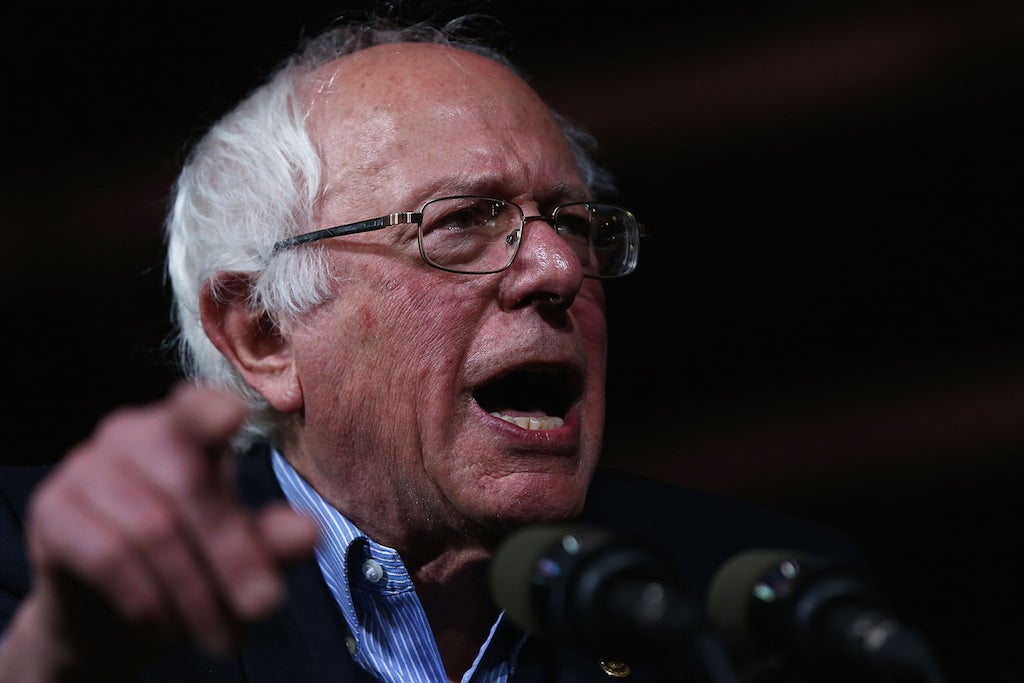Bernie Sanders fights on after winning four states on Super Tuesday
Bernie Sanders won in Vermont, Oklahoma, Colorado and Minnesota.

Your support helps us to tell the story
From reproductive rights to climate change to Big Tech, The Independent is on the ground when the story is developing. Whether it's investigating the financials of Elon Musk's pro-Trump PAC or producing our latest documentary, 'The A Word', which shines a light on the American women fighting for reproductive rights, we know how important it is to parse out the facts from the messaging.
At such a critical moment in US history, we need reporters on the ground. Your donation allows us to keep sending journalists to speak to both sides of the story.
The Independent is trusted by Americans across the entire political spectrum. And unlike many other quality news outlets, we choose not to lock Americans out of our reporting and analysis with paywalls. We believe quality journalism should be available to everyone, paid for by those who can afford it.
Your support makes all the difference.Bernie Sanders has vowed to remain in the Democratic presidential race after claiming four states in last night’s Super Tuesday contest, even as his path to the nomination narrowed further. The socialist US Senator for Vermont not only triumphed in his home state, where he won well over 80 per cent of the vote, but also chalked up wins in Colorado, Minnesota and Oklahoma.
Speaking to supporters in Essex, Vermont, Mr Sanders insisted: “Our message is resonating, and the people, when we stand together, will be victorious.” Referencing his repeated calls for a “political revolution,” he went on: “I know that Secretary Clinton and many of the establishment people think that I am looking and thinking too big. I don’t think so.”
In spite of his optimistic rhetoric, Mr Sanders proved unable to mount a serious challenge to the frontrunner, Hillary Clinton, in Southern states such as Virginia, Alabama, Arkansas, Georgia and Tennessee, where substantial black populations voted overwhelmingly for the former Secretary of State. African-Americans make up almost a quarter of Democratic voters.
Ms Clinton also won in Texas, where she attracted Latinos by a margin of two-to-one over Mr Sanders. Perhaps more crucially, she scraped through with a slim, symbolic win in Massachusetts, a liberal and largely white state next-door to her rival’s Vermont base. Last night, Ms Clinton seemed likely to leave Super Tuesday with around twice as many pledged delegates as Mr Sanders.
Although he now appears increasingly unlikely to secure the Democratic nomination, Mr Sanders’ overachieving campaign has succeeded in drawing attention to income inequality, to the inordinate power of Wall Street, and to the negative influence of money in politics – and in drawing Ms Clinton to the left on all three issues and more.
The primary trend towards Ms Clinton looks set to continue in the coming days with contests in two more Deep South states, Louisiana and Mississippi. The former Secretary of State is also forecasted to win by a wide margin in Michigan on 8 March – and again a week later, when Democrats in five major states including Florida, Ohio and Illinois go to the polls.
That, however, does not mean Mr Sanders will be forced to make his exit anytime soon. The Vermont Senator’s fundraising prowess means he may be able to afford to stay in the race until long after his chances of winning the nomination fade. On Monday, the Sanders campaign said it had raised more than $42m (£30m) in February, mostly from small donations averaging $30.
Join our commenting forum
Join thought-provoking conversations, follow other Independent readers and see their replies
Comments